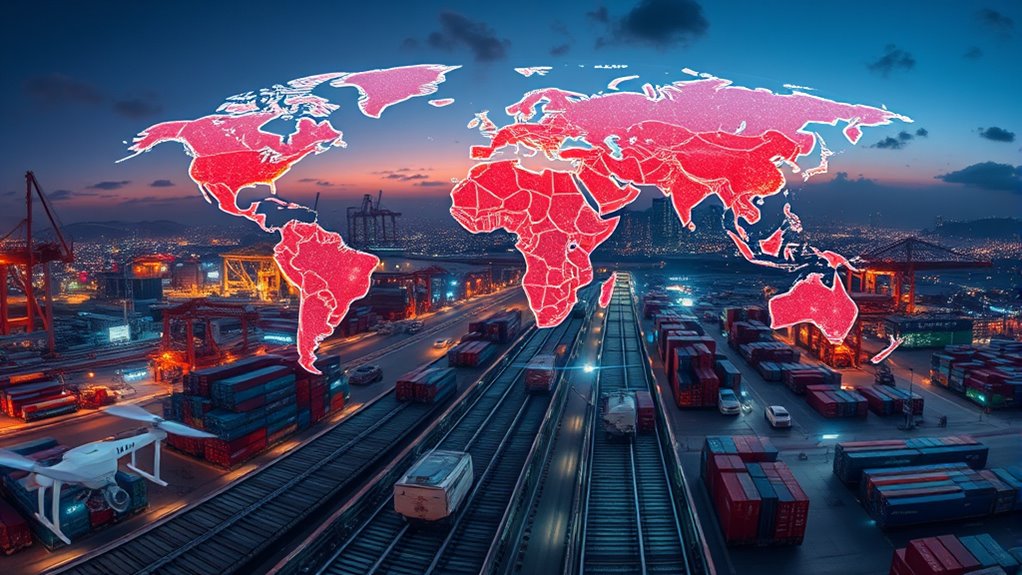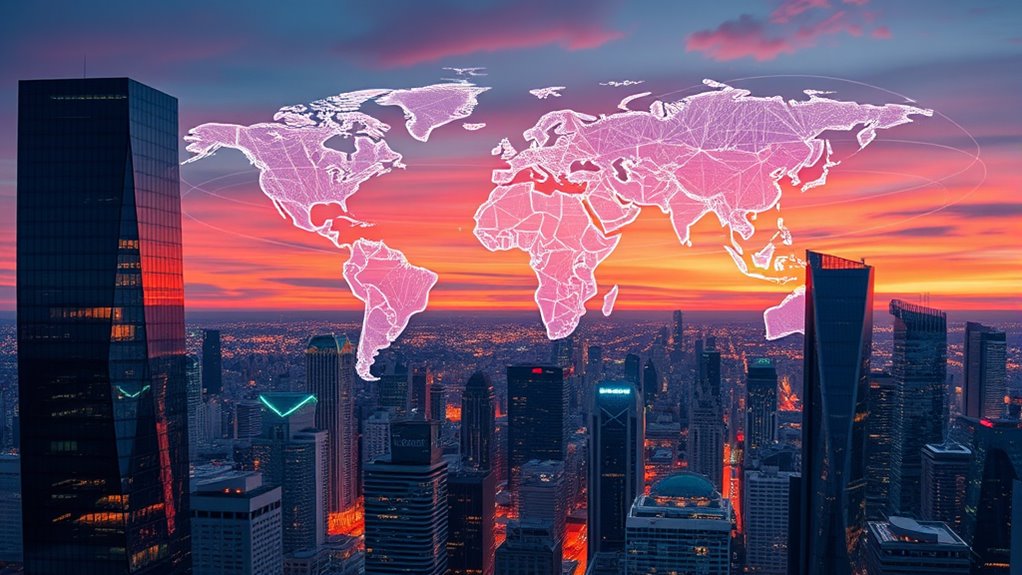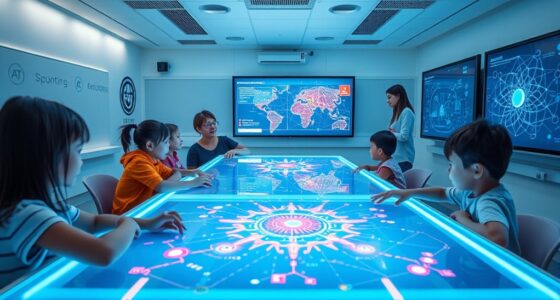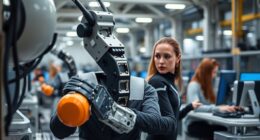By 2030, AI will eliminate traditional national borders in global commerce. You’ll see seamless cross-border interactions, personalized products, and automated supply chains that make international trade smoother than ever. AI’s growth will enable more inclusive participation, creating new jobs and opportunities worldwide. As companies embrace these changes, the world’s economy will become more interconnected and borderless. Staying informed will reveal how these transformations could shape your future involvement in global markets.
Key Takeaways
- AI enables seamless cross-border interactions, reducing reliance on national boundaries in commerce.
- Personalized AI-driven products and services cater to global preferences, blurring market lines.
- Automation and real-time data sharing optimize supply chains and logistics worldwide.
- AI democratizes expertise, allowing less specialized workers to perform advanced tasks globally.
- Investment in AI fosters a highly interconnected, borderless global economy by 2030.

Artificial Intelligence is transforming global commerce by breaking down traditional national boundaries and enabling seamless cross-border interactions. You’ll find that AI’s ability to personalize products and services makes it easier for businesses worldwide to cater to individual preferences, effectively blurring the lines between markets. Instead of being limited by geographic borders, companies leverage AI to tailor offerings, creating a more interconnected and competitive global economy. As AI-driven product improvements boost consumption, they generate a virtuous cycle of data and innovation, further accelerating this integration. This means your business can reach customers across borders with ease, automating and optimizing supply chains, customer support, and logistics to deliver faster and more efficiently. Increased productivity through automation and process optimization also plays a key role in enabling this borderless commerce environment.
By 2030, AI’s influence will be profound, with an expected contribution of up to $15.7 trillion to global GDP—a 14% boost over current predictions. This isn’t just about increasing output; AI will reshape how economies grow, creating new consumption patterns and productivity gains that could account for 3.5% of the world’s GDP. In retail and consumer goods, generative AI could increase productivity by 1.2–2%, adding hundreds of billions in value. The market for AI itself is poised for substantial growth beyond 2030, signaling a long-term transformation that will extend well into the future.
You’ll also notice that AI fosters a more integrated workforce. With 86% of businesses planning to reshape operations by 2030, new skills and organizational strategies will emerge across borders. AI allows less specialized workers worldwide to perform expert tasks, leveling the playing field and encouraging global collaboration. It accelerates economic integration as digital access expands, with investments in generative AI surging across industries. This automation creates millions of new jobs, supporting labor mobility and global interdependence. Additionally, technological advancements such as IoT and real-time data sharing further streamline operations and foster innovation.
Frequently Asked Questions
How Will AI Impact Local Job Markets Globally?
AI will reshape local job markets by creating new opportunities in tech, data, and sustainability sectors, while automating routine tasks like customer service and administrative roles. You’ll need to adapt by developing hybrid skills and embracing continuous learning. Regions with strong digital infrastructure will benefit most, but less connected areas may face displacement without proper reskilling. Staying flexible and upgrading your skills will help you thrive amid these rapid changes.
What Measures Will Governments Take to Regulate AI in Commerce?
Governments will implement a mix of export controls, licensing requirements, and national security measures to regulate AI in commerce. They’ll establish national AI laws to preempt inconsistent state rules and create regulatory sandboxes for safe innovation. Some will push for a federal moratorium on local regulations, aiming for unified standards. Expect increased oversight on advanced tech transfers, with safeguards to balance innovation and security, ensuring AI benefits are shared responsibly.
How Will AI Influence Cultural Differences in International Trade?
Ever wonder how AI will bridge cultural gaps in trade? It’ll help you communicate seamlessly across languages, reducing misunderstandings and fostering trust. AI personalizes marketing to local preferences, making your products more appealing worldwide. It also promotes inclusivity at international events and guarantees you understand cultural norms. With AI, you’ll navigate diverse markets more confidently, turning cultural differences into opportunities rather than obstacles, transforming global commerce into a more connected, understanding space.
Will AI Create New Economic Inequalities Between Nations?
Yes, AI will create new economic inequalities between nations. You’ll see developed countries capturing most AI-driven benefits, widening the gap with emerging economies that lack infrastructure and skills. Lower-income nations risk falling further behind as they can’t fully leverage AI’s potential. Without targeted policies, investments in digital access, and workforce reskilling, these disparities will grow, making it harder for less developed nations to compete and prosper in the global economy.
How Secure Will Ai-Powered International Transactions Be?
AI-powered international transactions will be increasingly secure, thanks to advanced cybersecurity tools that detect threats faster and more accurately. You’ll benefit from proactive fraud prevention, real-time anomaly detection, and automated incident responses. However, vulnerabilities remain, such as fraudster adaptations and data manipulation risks. Human oversight and strong international cooperation are essential to maintain trust, security, and guarantee AI systems stay resilient against evolving cyber threats.
Conclusion
By 2030, AI will blur national borders in global commerce, making it feel like one seamless marketplace. Imagine a world where over 80% of transactions are handled across borders instantly, with no regard for countries or currencies. You’ll experience a future where your business can trade effortlessly worldwide, breaking down old barriers. This shift will transform how you buy, sell, and connect, creating opportunities beyond what you can currently imagine.









